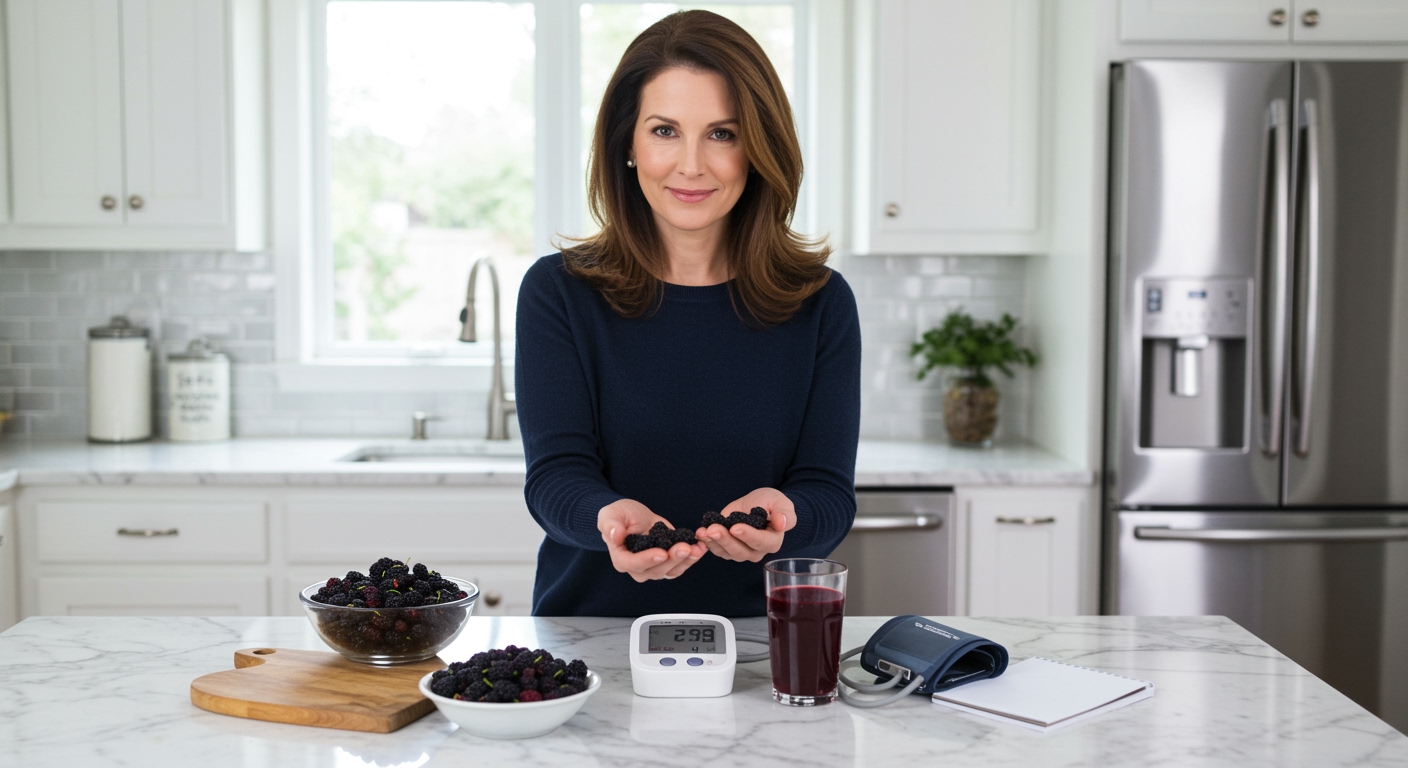✪ Key Takeaway: Mulberries can help lower blood pressure through anthocyanins and potassium that support healthy circulation.
Introduction
Your doctor just told you that your blood pressure numbers are creeping up again.
You might be wondering if there are natural foods that can help bring those numbers down without relying solely on medication.
Hi, I’m Abdur, your nutrition coach and today I’m going to explain exactly how mulberries affect your blood pressure and whether this sweet fruit deserves a place in your heart-healthy diet.
What Makes Mulberries Special For Blood Pressure?
Mulberries contain a powerful combination of anthocyanins and potassium that work together to support healthy blood pressure levels.
These dark purple compounds called anthocyanins act like tiny soldiers that protect your blood vessels from damage.
When your blood vessels stay flexible and healthy, your heart doesn’t have to work as hard to pump blood throughout your body.
The potassium content in mulberries helps balance out excess sodium in your system.
Think of potassium as nature’s way of helping your kidneys flush out extra salt that makes your blood pressure rise.
Research shows that people who eat more potassium-rich foods tend to have lower blood pressure readings than those who don’t.
✪ Fact: One cup of mulberries provides about 272 mg of potassium, which is roughly 8% of your daily needs.
How Do The Active Compounds Actually Work?
The magic happens at the cellular level inside your blood vessels.
Anthocyanins from mulberries help your body produce more nitric oxide, a molecule that tells your blood vessels to relax and widen.
When your blood vessels are wider, blood flows more easily and your heart doesn’t have to pump as hard.
This natural vasodilation process is the same mechanism that many blood pressure medications try to achieve artificially.
The potassium in mulberries works through your kidneys by helping them excrete more sodium through urine.
Less sodium in your bloodstream means less fluid retention, which directly translates to lower blood pressure readings.
Studies have shown that this dual action of vessel relaxation and sodium reduction can produce measurable improvements in blood pressure within just a few weeks.
✪ Pro Tip: Eat mulberries fresh rather than dried to get maximum potassium benefits without added sugars.
What Does The Research Actually Show?
Clinical studies have demonstrated that regular consumption of anthocyanin-rich berries can reduce both systolic and diastolic blood pressure.
One significant study found that people who ate berries high in anthocyanins experienced an average reduction of 4-6 mmHg in their systolic blood pressure.
While that might not sound like much, even small reductions in blood pressure can significantly lower your risk of heart attack and stroke.
The research specifically on mulberries shows that their unique combination of compounds may be even more effective than other berries.
Scientists have found that mulberry extract can help reduce arterial stiffness, which is a key factor in high blood pressure development.
The most impressive results came from studies where participants ate fresh mulberries daily for 8-12 weeks consistently.
These people showed not only lower blood pressure but also improved overall cardiovascular health markers.
✪ Note: Results typically become noticeable after 4-6 weeks of consistent daily consumption.
How Much Should You Eat For Blood Pressure Benefits?
The optimal amount appears to be about one cup of fresh mulberries per day, which provides roughly 60 calories and significant amounts of beneficial compounds.
This serving size gives you approximately 272 mg of potassium and a substantial dose of anthocyanins without excessive sugar intake.
You can eat them fresh as a snack, add them to your morning oatmeal, or blend them into a heart-healthy smoothie.
The key is consistency rather than large occasional doses.
Your body processes these beneficial compounds relatively quickly, so daily intake provides the best results for blood pressure management.
If fresh mulberries aren’t available year-round in your area, frozen ones work just as well and retain most of their nutritional value.
Just make sure to choose frozen varieties without added sugars or preservatives that could counteract the cardiovascular benefits.
✪ Pro Tip: Combine mulberries with other potassium-rich foods like bananas and spinach for enhanced blood pressure support.
Are There Any Side Effects Or Precautions?
Mulberries are generally safe for most people, but there are a few important considerations to keep in mind.
If you’re already taking blood pressure medication, adding mulberries to your diet could potentially enhance the effects.
This isn’t necessarily dangerous, but you should monitor your blood pressure more closely and discuss it with your healthcare provider.
People with kidney problems need to be cautious about increasing their potassium intake significantly without medical supervision.
The natural sugars in mulberries are relatively low compared to other fruits, but diabetics should still account for them in their daily carbohydrate planning.
Some people may experience mild digestive upset when first introducing mulberries, especially if they eat large quantities right away.
Start with smaller portions and gradually increase to allow your digestive system to adjust to the increased fiber intake.
✪ Note: Always consult your doctor before making significant dietary changes if you take blood pressure medications.
The Bottom Line
Mulberries can indeed help lower blood pressure through their unique combination of anthocyanins and potassium that support healthy blood vessel function.
The best medicine often comes disguised as delicious food that makes you forget you’re even trying to be healthy.
I’d love to hear about your experience with mulberries or any questions you might have about incorporating them into your blood pressure management plan, so please share your thoughts in the comments below.
References
At NutritionCrown, we use quality and credible sources to ensure our content is accurate and trustworthy. Below are the sources referenced in creating this article:





